Unplugged: GoDice
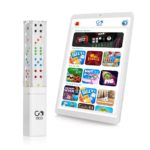 Straying as close as possible to a videogame without going over, GoDice is a set of dice that can be digitally linked to one’s phone or (better still) tablet. The dice then serve as a physical component for one of many games available on the system. Together, the dice and device form a “phygital” (their word) game system where players roll physical dice that use Bluetooth to interact with digital games in their app. The app currently comes with a wide range of (extremely) simple to moderately involved games and more have been added over time.
Straying as close as possible to a videogame without going over, GoDice is a set of dice that can be digitally linked to one’s phone or (better still) tablet. The dice then serve as a physical component for one of many games available on the system. Together, the dice and device form a “phygital” (their word) game system where players roll physical dice that use Bluetooth to interact with digital games in their app. The app currently comes with a wide range of (extremely) simple to moderately involved games and more have been added over time.
GoDice
Publisher: Particula Ltd.
Ages: varies (probably 7+)
Players: 1-4+
Time: varies (30 min or less)
(Review copy provided by publisher)
GoDice is more than a single game, it is an entire gaming system consisting of one or more physical dice that are used alongside a phone or tablet. Each die has internal green and red LEDs and can communicate over Bluetooth.The dice come in several options. The “full pack” consists of six unique 6-sided dice. The pips of each die are colored for identification purposes (so you and the app agree on which die is which.) A much cheaper option ($40ish vs $100ish) is a set of just two dice. This is not a bad deal as the majority of the currently provided games only require the use of two dice. Note, there is an option for a single six-sided die but it is really only used to work as a digital version of a 20-sided die.
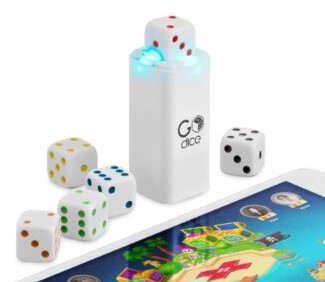
I must say that the presentation of the dice is of the highest caliber. Opening up the (fancy hinged) box of 6 dice reveals a stack of six dice encased in a high quality clear tower fit upon the charging base (powered by a couple of standard batteries.) Sliding open the top, the dice slide nicely into one’s hand. To charge (or recharge) a die, simply press the 5-side of the die down onto the charger and hold it there for a few seconds until it flashes that it is fully charged. The use of the 5-side of the die is a great engineering choice as it means it charges with the 5-side down, regardless of its orientation. Promotional materials show someone sliding the tower of dice (on the charger base) into one’s pocket for on-the-go gaming but that is pushing things a bit as it gets pretty long. If you separate the base and the clear tower it will fill up, but still fit in a pocket. Since the games are far better played on a tablet than a phone, the added bulk of the tower shouldn’t be much of a factor.
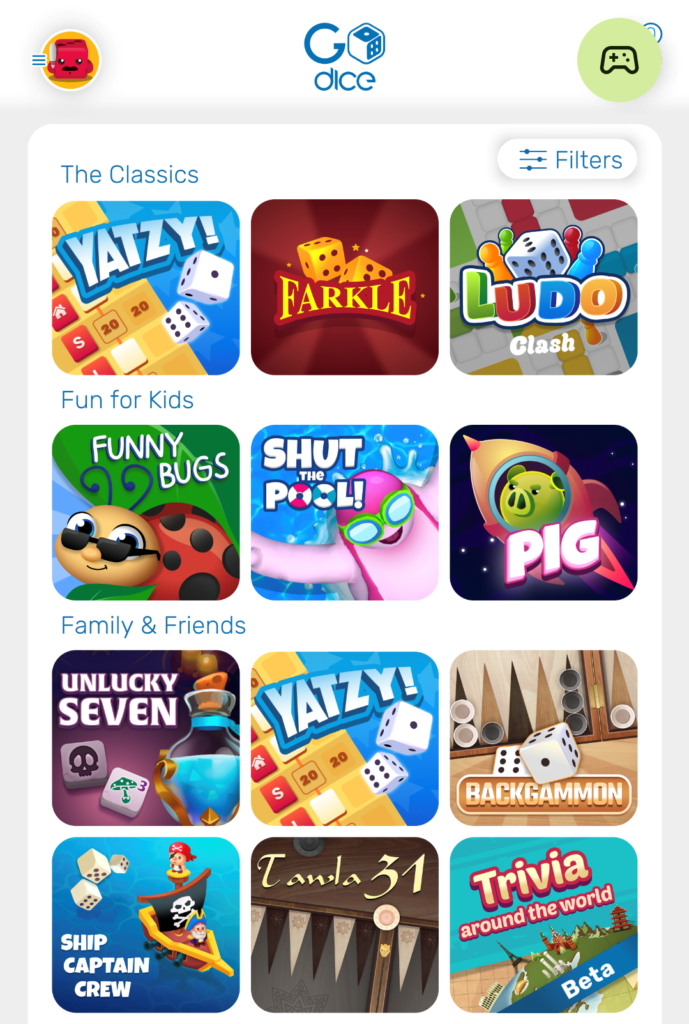
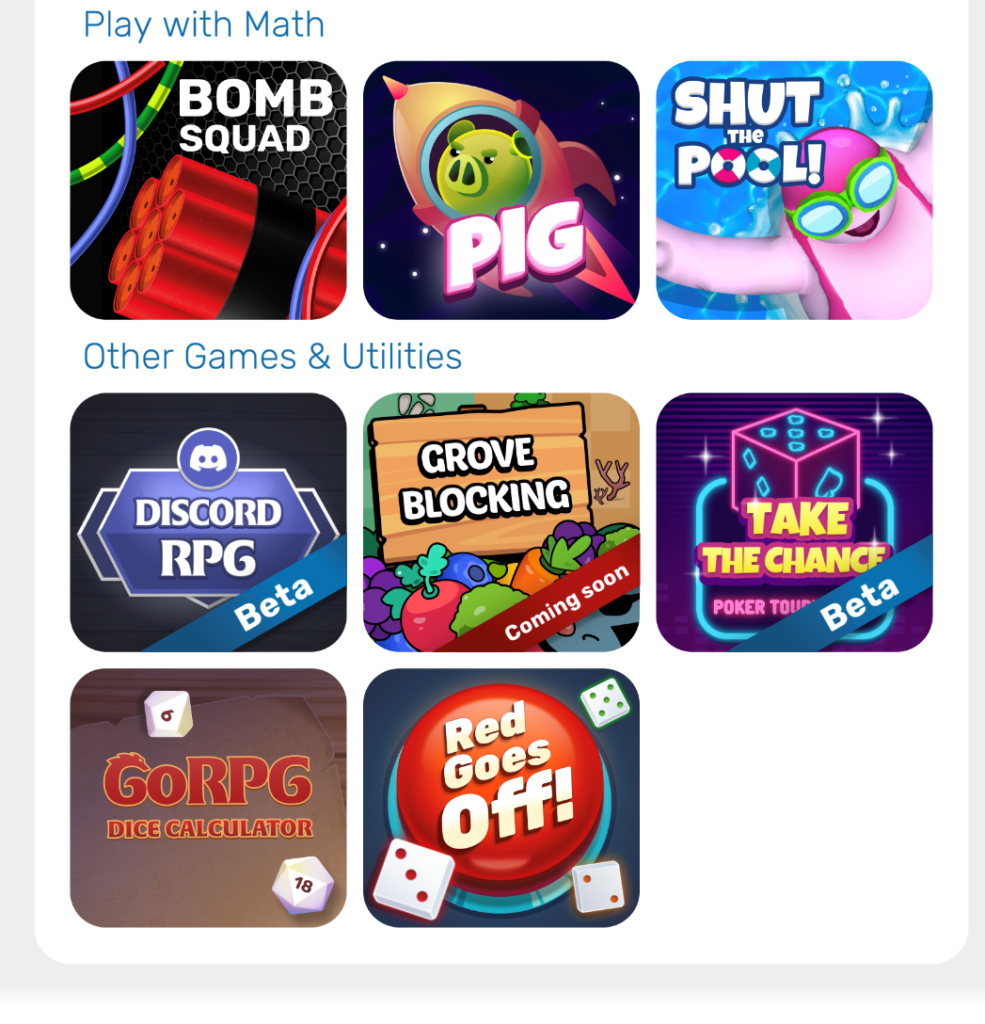
All the sleek engineering will be for naught without some decent games available to play. There are currently 12-ish games (some in various stages of beta) to choose from and they run the gauntlet from “activity” to actual serious games. Many are traditional public-domain style games like Ludo Clash (Sorry!), Backgammon, Tawla 31 (old version of backgammon), Shut the Pool! (Shut the box), Farkle, and Yatzy! (you can guess.) The digital implementation of each game is solid and works fine, but I’ll call out Ludo Clash specifically because it adds in the ability to get a “free 6” rolled twice in the game – this is a huge improvement to make sure a player can get one of their pieces out onto the board at the start of the game. Of those listed, I prefer the GoDice version of Farkle simply because it takes all the headache of funny scoring out of the equation.
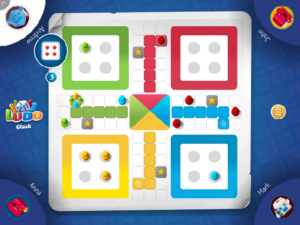
Unfortunately, there were a few “duds.” Funny Bugs is a faithful implementation of the game Cooties – which is an activity with absolutely no decisions to be made. Pig is supposedly a math game, but this Candyland/Chutes and Ladders style game does not particularly inspire much math-ing.
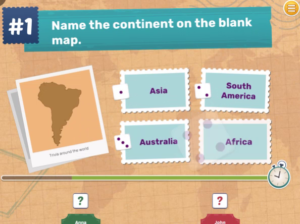
I have mixed feelings about Trivia around the world. On the one hand, I love the implementation – questions are provided and then players take their personal die and place it face-up to match their answer. The game focuses on world geography, which is fine, but even on the hardest setting there were plenty of “easy” questions. The dice are six sided, but only 4 choices are given for each question, it seems like a lost opportunity not to use all 6 sides of the dice.
I consider Unlucky Seven as moderate successes. Unlucky Seven is a push-your-luck game that is fun, but I feel like there is not a lot of freedom of choice to be made. It almost feels like one needs to get lucky in rolling in order to have a meaningful decision about whether to push one’s luck even further.
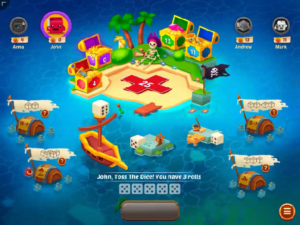
Ship Captain Crew is a solid, lightweight game where players are rolling (and rerolling) dice to try to match sets of dice as indicated by the floating treasure chests. These chests vary throughout the game so one is always trying to match different sets. I like the game because each of the four treasures have a different scoring condition so a player can pursue different goals depending on their first roll. There is still a heavy luck element but the game gives players enough options so that it does feel like there is some sense of control over one’s fate.
Red Goes Off! is what you get if GoDice are crossed with the game of spoons. The dice are placed in the center of the table, one per player. Lights on the dice are cycled green. When a dice turns red, everyone must grab one of the green dice. The person who is left with the red die is out for the rest of the round. Last player standing wins.
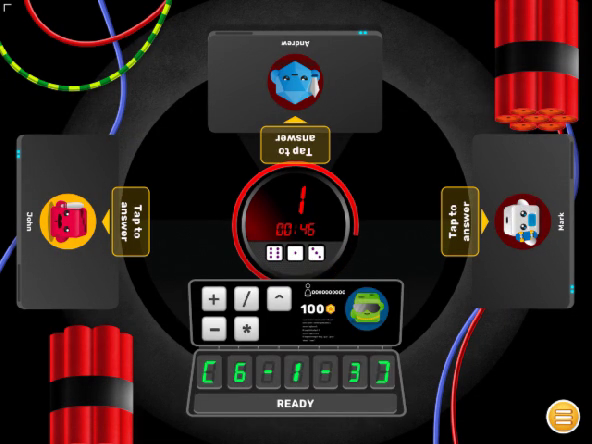
My favorite game by far is Bomb Squad. This is a math-based game but can be simple enough for an elementary school student to play, but higher levels remain challenging even for my Physics professor spouse. A random number (low double-digits at easy, low-ish triple digits on higher difficulty levels) is selected and then three dice are rolled. Players then race to use the digits on the three rolled dice in order to come as close as possible to the random number. You can use the dice numbers in any order and they can even form two digits numbers (so a 3 and a 4 could be used to make the number “43”.) In addition, players can use the four basic arithmetic functions (plus/minus,multiply/divide) and any level of parenthesis desired. To kick it up a super notch, you can even use exponents (like 3^4 representing 81.) Players are given 30 seconds or so to try to secretly type in (each of the 4 players interact with the tablet on their side of the screen) their best equation. The closest one wins. To give one final example, if the target is 30 and 3,6,7 are rolled, one guess could be 7*3+6 = 27 or a better one would be 37-6 = 31. I love this game and unlike many games, it really does encourage or at least reward math abilities. Since there is a speed component, it isn’t always the best mathematician who wins.
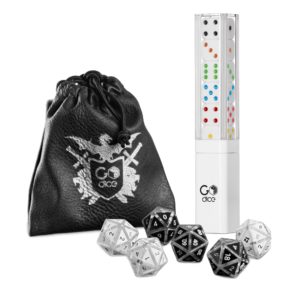
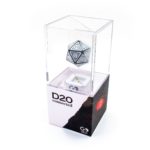
GoRPG is a program that uses a special set of hollow polyhedrals that can be used for many common pen and paper roleplaying games (RPGs.) A full set includes a 4, 6, 8, 10, 12, and 20 sided die shell. Unfortunately, I wasn’t able to get a trial of the shells so all I can do is convey the promotional information. I’m impressed that they intend to get 20-sided positional information on a single die. If that works well, it means all the dice should function just fine. The set of shells can be purchased alongside the set of 6 dice (around $130) or by themselves if you already have the dice ($40 or so.) There is also an option to buy a single die and a d20 shell ($40ish) if the digital RPG option is what you are most interested in. I’m not all that impressed by the GoRPG program, but there is also (in beta) an option to pair your dice to a GoRPG web extension that will interface the dice with common online roleplaying servers (Discord, Roll20, FoundryVTT, etc…) If that works well, I could see the dice-crazy RPGers taking a serious interest in the set.
Verdict:
GoDice is clearly a “gimmick” but it is a gimmick that is well executed. The presentation, feel, and operation of the dice are very well done. The precision needed for a die to emulate a 20-sided die is impressive (if it works well.) As with many products of this type, the games provided are a mixed bag. You know what you’re going to get with Backgammon, “Sorry”, “Yahtzee”, and Farkle. The special dice don’t add that much, but having a ready gameboard and an automatic way to keep score is nice. Of the rest of the pack, Ship Captain Crew I could see as a decent kid game and Red Goes Off could be part of a party game night. The clear winner for me is Bomb Squad. It isn’t very often that a math-oriented game is any good but this one is very impressive. Is the set worth $100+? Possibly, especially since additional games are added over time. Another couple of solid keepers in the list would make GoDice more than just a fun show-and-tell factor. If the RPG dice side works well (rolls resolve correctly, pairs with a computer reliably, etc…) that would be a big bonus for fans of online roleplaying.
Kid Factor: The dice light up and are fun to roll. The wide variety of games (technically some are basically activities) means the dice can be used with a wide age range. The dice and even the carrying case seem pretty study so I would feel comfortable lending them out to an elementary kid in any situation where I’d let them use a tablet.





Discussion Area - Leave a Comment